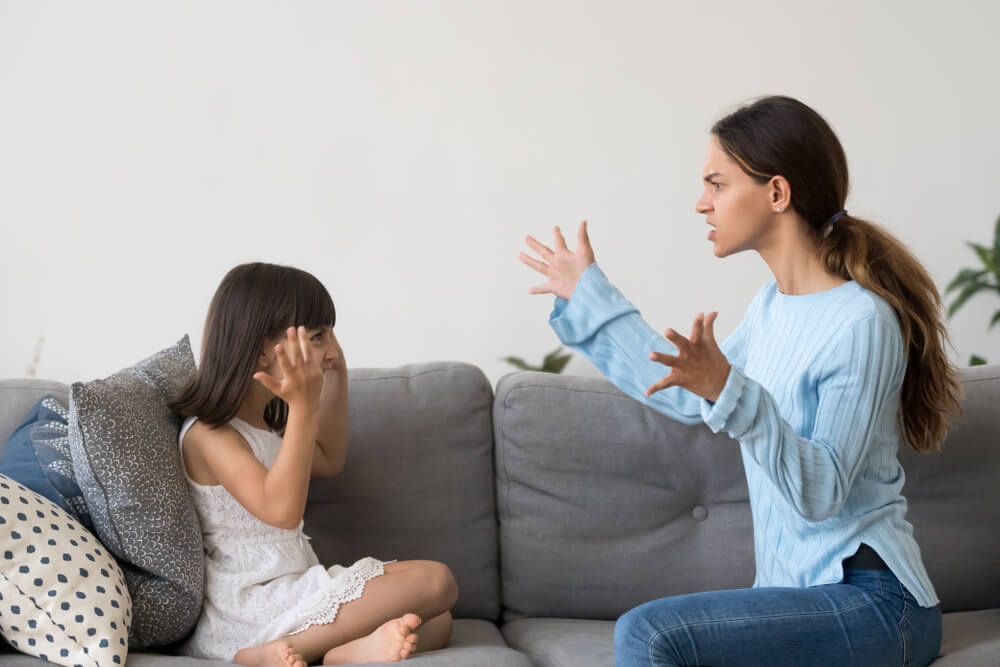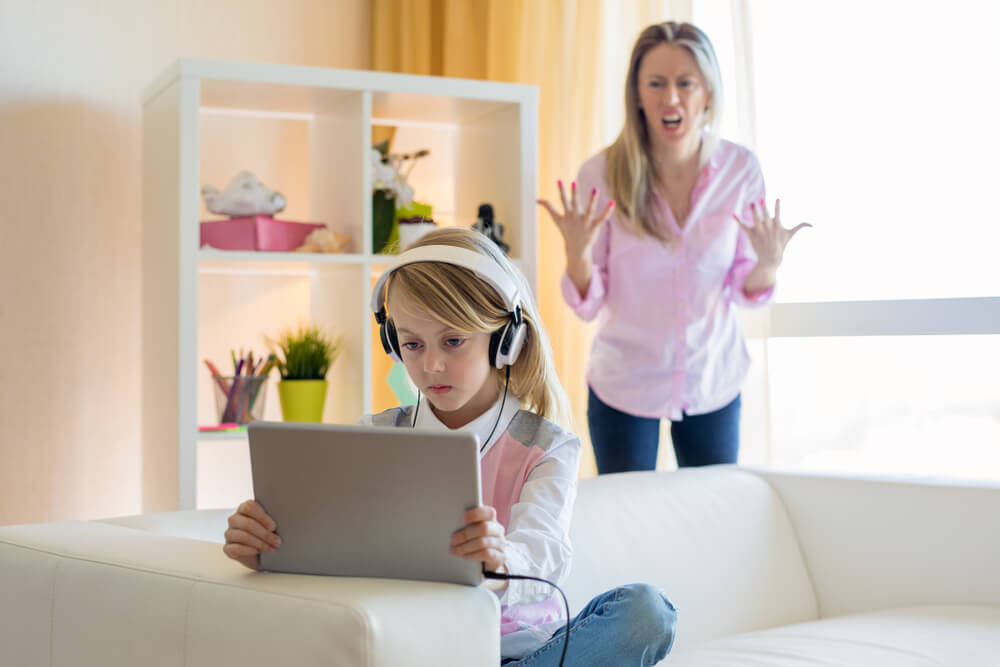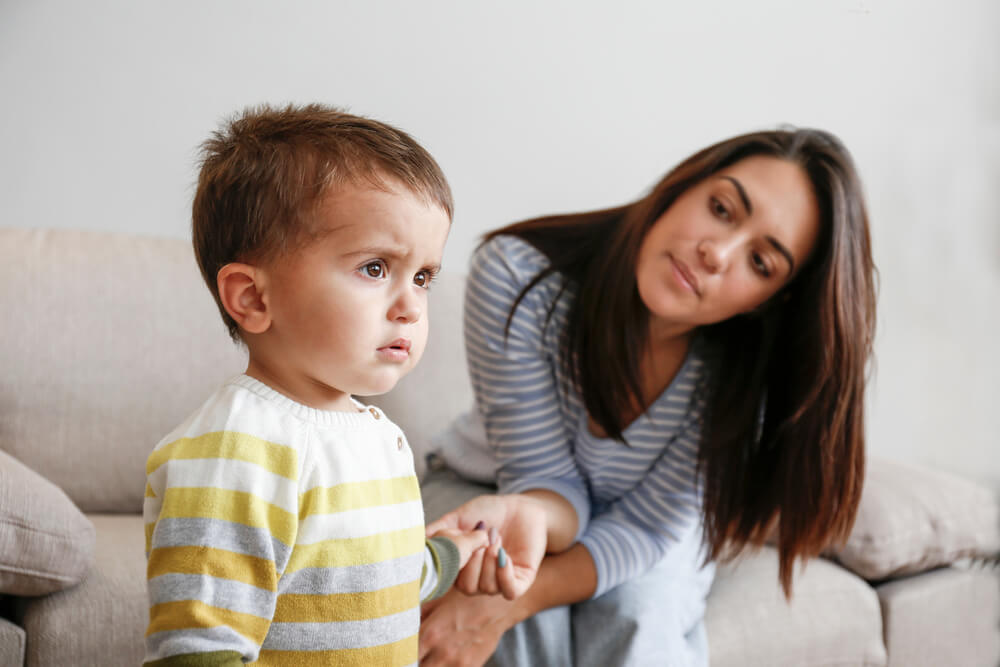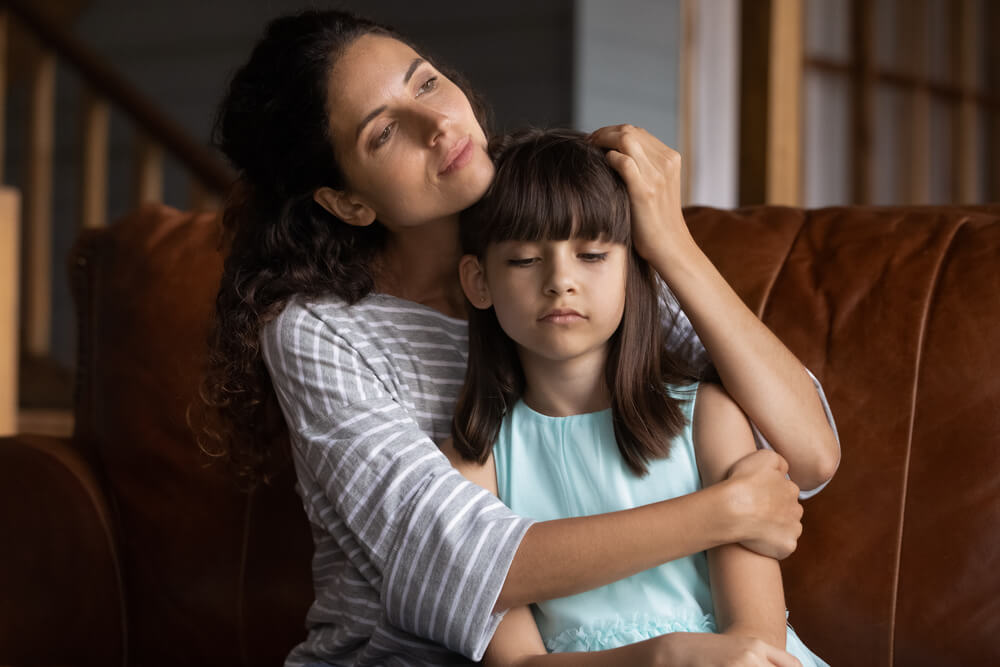8 Reasons Why We Yell at Our Kids and How to Stop

You’re late, and no one can find their shoes. One child hits your other child—again. You’ve asked your teen three times to get off the iPad. In all of these scenarios you’ve tried to stay calm, but eventually, your frustration overflows.
No one wants to yell at their kids. We start with good intentions for discipline, but so many of us end up shouting.
What’s going on here?
If your parenting strategies are louder and more fraught with irritation than you ever intended—and if you’re desperate to know how to stop yelling at your kids—read on.
Contents:
Reasons Why We Yell

Prostock-studio/Shutterstock.com
First, let’s tackle the elephant in the room: sometimes you need to get your kids’ attention quickly. If your two-year-old is about to run into traffic or your four-year-old reaches for a hot pan, a sudden outburst is instinctual and effective. But if we’re being honest, most parental screaming has nothing to do with keeping our kids safe.
Let’s talk about some common reasons why raised voices often dominate our parenting.
External factors
If it’s getting easier and easier to blow up at your kids, chances are you’re stressed, tired, hungry, or mad about something else. We tend to take out our frustration on those around us, and that often puts our kids in the firing line.
Anger is the easier road
Anger is an easier emotion to acknowledge, and we often feel justified in it. But anger is a secondary emotion; it usually masks other primary emotions like fear, embarrassment, or guilt, which can be harder to unpack.
We’re not getting what we want
All conflict comes out of thwarted desires. Are siblings fighting again? Your desire for a quiet, peaceful home isn’t being met. Kids are making you late? You want to be known as reliable and punctual, and your kids’ lack of preparation or inability to get out the door on time is messing that up.
Unrealistic expectations for behavior
If your parents expected certain things from you (a clean room, a certain work ethic, a level of gratitude), then you may have these same expectations for your kids. But it’s important to keep your children’s ages and maturity in mind. A four-year-old might whine when you tell her she can’t stay up late, even though you just spent the entire day doing fun things for her. It may be her ingratitude, but she’s also at an age where she can’t see past her own wants.
It worked in the past
Shouting accomplishes what we want, at the moment: the kids hurry up, or they stop fighting, or the tantrum stops. But what is that accomplishing for your relationship? By the time they reach the teenage years, you might find yourself in a difficult place.
We have no idea what else to do
We’ve all been there, witnessing the chaos, and we have no clue what to do. Either we can’t think how best to handle the situation, or we’ve never tried other ways to cope with our frustration. But like any other skill, it takes practice.
Small things, built up
Sometimes we explode over small things. In isolation, they don’t seem like a big deal, but if they build up without us processing or dealing with them, it gets easier for internal angst to spill over into the external.
It’s what we learned
We yell because it’s all we experienced in childhood. Mom yelled, so now we yell. We learned that yelling is the only way to get what you want, influence another person’s behavior, or handle your anger. We didn’t like it, and yet we continue the cycle.
If any of these reasons for yelling resonate with you, keep reading for some practical tips on how to parent without yelling.
How to Stop Yelling at Your Kids

Prostock-studio/Shutterstock.com
We yell because we want something to change—usually, the child’s behavior. But what if we told you that change starts with you?
Take stock
During heated moments, one of the most important questions you can ask yourself is, “What’s happening in me?”
For instance, say your toddler throws a massive fit in public. Instead of yelling at him, what if you stopped and thought about your own emotions? Maybe you feel embarrassed. Perhaps you think your child’s behavior is a direct reflection of your parenting, which isn’t always the case.
Fear and worry play a big part in our reactions.
If something your child does exacerbates your worry about his future (“If he keeps acting like this, how is he going to keep friends or find a spouse?”) remind yourself that sometimes kids’ behavior is a lack of maturity, not a character flaw set in stone.
Stay calm
“If I knew how to stay calm,” you might be thinking, “then I wouldn’t need to read this article”. When we’re yelling at our kids, the fight-or-flight center of our brains is engaged—and the rational side of our brains is not.
The key to staying calm is to buy time. Before you react, pause.
Whatever you can do to avoid that default reaction can drastically increase your chances of staying calm. Count to ten (or fifty, if that’s what it takes!). Take long, deep breaths.
Even doing something different with your body can help, like sitting on the floor or leaning back in a chair. It’s hard to yell at someone from a reclining position. Get your body calm, and your brain will follow.
Manage external factors
If your fatigue or stress is making it easier for you to yell, look at what you can change. Do you need to go to bed earlier? Can you delegate some of your day-to-day tasks? Do you need to say “no” to things for which you don’t have the capacity? Figure out ways to cut back on your busyness, and your tendencies to yell may drop, too.
Ask Questions
Asking questions can help you understand your child better. It isn’t about the questions we often yell in the heat of the moment, like “What are you doing?” or “Why would you ever think that’s a good idea?”
Earlier the fight-or-flight center of the brain has been mentioned. When you’re yelling at your kids, they’re going to react out of fight-or-flight, too. Their defenses are way up—and they won’t learn any lessons you’re trying to teach. They can’t.
Wait until a calmer time (even if it’s hours later), then ask questions. This will help you understand your child, and it will help them build problem-solving skills. A few examples:
- “You seem to struggle when it’s time to leave the house. What might help you be more prepared ahead of time so we don’t keep having this same problem?”
- “You were upset when your brother took your toy, weren’t you? Next time, what could you do instead of hitting him?”
We often yell out of exasperation, because kids are not “learning the lesson”. Let’s teach the lesson when they’re able to hear it.
How to Get Toddlers/Kids/Teens to Listen

Prostock-studio/Shutterstock.com
Here’s something that might blow your mind: toddlers, kids, and teens are people. Smaller, and with still-developing brains, but still people—with the same emotions and wants and needs as adults.
Ask yourself: what makes me want to listen to someone else?
Respect
Let’s relate it to our own lives. What kind of boss do you respect and listen to? One who respects you back, listens to your concerns, and encourages you both when you do well and when you mess up? Or one who storms into your office every time you make a mistake, yelling and threatening?
Not a hard question. We all have a desire to be listened to, to be respected, and to be understood.
So how do you get your kids to listen? Speak to them respectfully. Don’t let your anger or raised voice distract from the actual request you’re making.
Empathize
Another key is to empathize. We all respond better when we feel seen and understood. Your teen can’t get off their phone? Acknowledge how they feel about their phone and how it keeps them connected to their friends. Then, set the boundary and expectations for screen time.
Even toddlers need to know you’re on their team.
Say at bedtime, your three-year-old has come out of their room for the twentieth time. Maybe they’re being outright defiant, but it could be other factors: they want to be near you, they’re feeling scared or worried, or their little brain can’t understand why the fun has to end.
FAQ

Prostock-studio/Shutterstock.com
Will My Toddler Remember Me Shouting?
The little years are formative. It’s hard to say if your toddler will remember that specific incident of you shouting, but the feelings they experiences and the lesson you’re teaching then all play a part in shaping their identity.
The good news is, parenting is made up of a million small moments. If you’ve shouted at your kids in the past, you can still practice these tips and work towards a calmer, more connected parenting experience.
And if you mess up again, be sure to apologize afterward. Chances are that’s the main thing your child will remember.
I Yat My Child and Scared Them—How Can I make it Right?
Before you go back to your child, work to calm yourself first. Kids can tell when we pretend to apologize or say the right words in a sarcastic tone. Once you feel you’re a safe presence, go back to your child and get on their level. Offer an apology and the opportunity for physical touch, but don’t force them into a hug.
It depends on your child’s personality and sensitivity—they might go straight in for the hug and then move on to the next thing, with all forgiven. Or they might take longer to process the situation. Give them time and space if they need it.
A Long but Rewarding Process

Prostock-studio/Shutterstock.com
We all want to have a good relationship with our kids, but that kind of calm connectedness starts with us. If you can recognize your emotional triggers and work hard to stay calm (and activate the rational part of your brain), you’ll be able to respond wisely to your kids, instead of just reacting in anger.
Remember, asking helpful questions in calm times is the best way kids will learn.
And we’re all learning. If you do mess up, keep apologizing. True change is not always one drastic U-turn, but a thousand small corrections over time. One day you’ll look back and see how far you—and your children—have come.
Проверьте электронный ящик



















